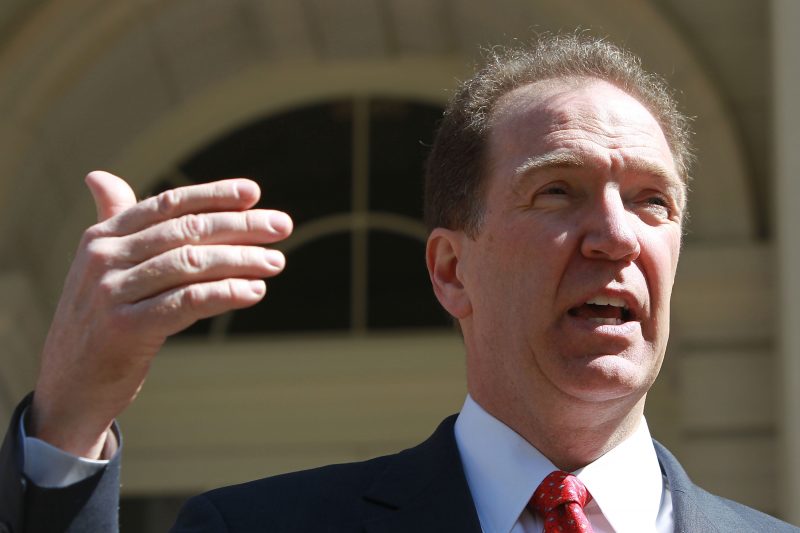Trump’s controversial pick to lead World Bank could spark revolt
US Treasury official David Malpass has been highly critical of institutions like the World Bank, calling their lending “corrupt” (MARIO TAMA)
Washington (AFP) – President Donald Trump’s controversial choice to lead the World Bank could spark a revolt against US dominance of the institution and spur other members to unite behind an alternate candidate.
The White House has confirmed to fellow Group of Seven nations that Trump will nominate US Treasury official David Malpass, a person familiar with the matter told AFP, intending to maintain US control of one of the leading global bodies.
The Washington-based lending institution has been led by an American since the bank’s founding in the aftermath of World War II, while its sister institution, the International Monetary Fund, has always been led by a European.
In recent years, the growing emerging market countries have challenged this unwritten arrangement, demanding a more open, merit-based selection process.
Experts on the process had thought it unlikely those countries would join forces against the US candidate, but agreed they might react more strongly to Malpass, a strident critic of the World Bank and IMF who has called their lending “corrupt.”
Many, including former Treasury officials from both US political parties, have sharply criticized Malpass and his qualifications, pointing to his failure to foresee the global financial crisis and opposition, which later proved unjustified, to Federal Reserve policies.
– ‘Disastrous choice’ –
“David Malpass would be a disastrous, toxic choice for World Bank president,” said Tony Fratto, former Treasury assistant secretary in the George W. Bush administration.
Justin Sandefur, senior fellow at the Center for Global Development, said Malpass “has committed economic malpractice on a wide range of topics, from dismissing the first signs of the 2008 global financial crisis to flirting with the abolition of the IMF.”
Malpass, currently US Treasury undersecretary for international affairs, has sharply criticized the World Bank for continuing to lend to China and other relatively well-off countries.
And in testimony before Congress in November 2017, he said the World Bank and IMF were “often corrupt in their lending practices, and they don’t get the benefit to the actual people in the countries” but to those “who fly in on a first-class airplane ticket to give advice to the government officials.”
Malpass was chief economist at the former investment bank Bear Stearns from 1993 until it collapsed in 2008 at the start of the global financial crisis, and ran unsuccessfully for the Senate, before serving on Trump’s transition team.
But last year he led negotiations that ended with a “historic” increase in the bank’s lending capital by $13 billion, after shareholders agreed to a reform package that curbs loans and charges more for higher income countries like China.
The surprise early departure of World Bank President Jim Yong Kim, effective February 1, not even halfway through his second five-year term, allows Trump to weigh in on his successor.
After reshaping the US presidency, traditional alliances, trade relations and the US Supreme Court, Trump now could have a chance to influence how countries like China access concessional lending.
The bank’s board will accept nominations from February 7 through March 14, and plans to name a new president prior the IMF and World Bank Spring meetings, set for April 12-14 in Washington. Any of the 189 members can propose a candidate.
The United States is the biggest shareholder in the World Bank but does not have a veto and needs the backing of European nations in a simple majority vote by the board.
However, if Europe were to oppose the US selection, it would tacitly be giving up leadership of the far more prominent IMF once its current chief Christine Lagarde departs.
– Eroding credibility –
Mark Sobel, who had a long career with the US Treasury Department and oversaw relations with the IMF, and who overlapped with Malpass at Treasury, declined to comment on the choice.
However, he cautioned that failure to name a “credible” candidate could unite World Bank members to oppose the US choice, especially if that choice is “a person seen as hostile to the institution.”
He has called for an end to the tradition of Americans and Europeans leading the two primary global lending institutions.
“I also think that ultimately institutions are better served by having a credible person running them regardless of their nationality,” Sobel told AFP.
Masood Ahmed, who had a long career at the World Bank and IMF, and now is the president of the Center for Global Development in Washington, warned that failure to select a leader through a “truly merit-based” process, “ends up eroding a little further the legitimacy and credibility of the organization.”
Other potential candidates Trump reportedly considered included former Nigerian Finance Minister Ngozi Okonjo-Iweala — who was nominated by African countries to compete against Kim in 2012 — and former PepsiCo CEO Indra Nooyi, an Indian-American.
Disclaimer: This story is published from a syndicated feed. Siliconeer does not assume any liability for the above story. Validity of the above story is for 7 Days from original date of publishing. Content copyright AFP.


